|
|
Tuesday, November 26, 2013 |
|
Lessons learned from the Hawaii ‘gay marriage’ fight
By Selected News Articles @ 8:13 PM :: 7560 Views :: Family, First Amendment
|
|
Lessons learned from the Hawaii "gay marriage" fight
Moving forward . . .
From Mass Resistance November 24, 2013
The spectacle of "gay marriage" being pushed through the Hawaii Legislature's "special session" was unlike anything we've seen elsewhere. The outpouring of effort by Hawaii citizens against it was unbelievable. The process was extraordinarily corrupt and insulting. Rarely has such a huge public opposition to a bill been so blatantly ignored by politicians. See our full Hawaii Report HERE.
But we don't believe such defeat is inevitable. There are some important lessons from this and other recent "gay marriage" battles which the pro-family movement must recognize and use productively.
[Note: Photos below were taken exclusively for MassResistance.]
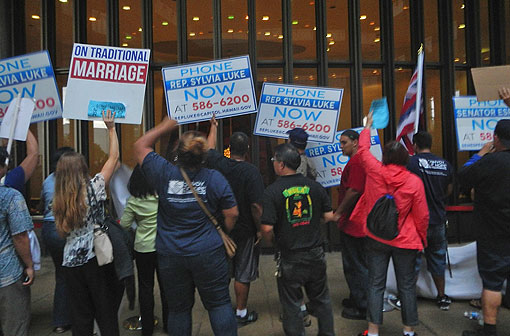
Not giving up. Pro-marriage citizens outside the gates of the Hawaii State House in the early morning hours during the special legislative session
Here's what we've observed:
1. Huge forces stacked against us in these battles
Pro-family groups enter these fights at an enormous disadvantage. The points below unfortunately have been constants in every "gay marriage" battle around the country (and in other homosexual issues). We've had to react to them (and endure them), but have not yet prepared effective answers to them.
Hawaiian citizens fought this harder than we've seen in most other places. In some ways they are in a class by themselves. But there is no question that they were up against overwhelming odds. And for the most part, they didn't see it coming and unfortunately weren't equipped to stop it.
2. What was different in Hawaii -- good and bad
The "gay marriage" battle in Hawaii was certainly different than other places we've seen:
-
Massive outpouring of people from across the state
In Hawaii, the massive number of regular citizens who came out against "gay marriage" was breathtaking -- especially for a state where people rarely participate in politics at all (see below) and where traveling between islands to the State House in Oahu is difficult and expensive.
Thousands came to rallies prior to the special session. Ten thousand people came to a rally the morning of the session. Over five thousand signed up for the House hearing, over a thousand actually testified and over 24,000 written testimonies were submitted. It certainly took enormous arrogance for the politicians to ignore these people.
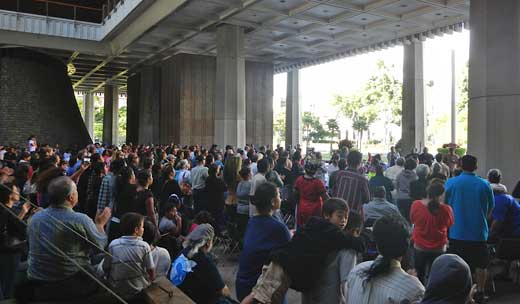
Not letting up. On Sunday afternoon, Nov. 10, hundreds of pro-family citizens filled the State House atrium area for a Solemn Assembly gathering, while they awaited the Senate vote.
- Fight organized by individual churches, small groups, and activists
In most states there is an established statewide pro-family group that takes over everything when a "gay marriage" battle comes up. But in Hawaii the churches are very strong and influential in their areas, while pro-family groups are less so. The "gay marriage" fight was entirely coordinated by a loose coalition various churches, small pro-family organizations, and individual activists -- all self-funded (as far as we could tell).
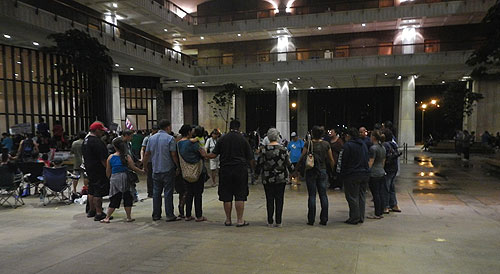
Strong religious presence. In the evening hours on Nov. 6, awaiting the House vote, people gathered in the State House atrium for prayer.
-
Lowest voter turnout in America -- and its effect on politicians
Hawaii is consistently rated as having the lowest voter turnout and the least amount of citizen political participation in America. Hawaii has small legislative districts, thus a small group of people -- such as a special interest group -- can have an inordinate amount of influence on politicians seeking re-election. Since the legislature is overwhelmingly Democrat, it's likely that the far-left Democrat base which is usually the most active puts forth a lot of candidates and calls a lot of the shots once they're elected. Thus, there's a disconnect from many regular citizens.

No power to the people. Signs like this were everywhere. A large part of the public hearing testimony was taken up by people who pleaded for the right to vote on "gay marriage." They felt (with justification) that the 1998 Constitutional Amendment on marriage was being subverted. But their pleas were completely ignored by their legislature.
That's a recipe for arrogance. Politicians in Hawaii are thus much less afraid of a voter backlash for anything they might do. Since the state is basically controlled by the left wing of the Democrat Party, while a large part of the population is socially conservative, this adds to the disconnect.
Hawaii is a curious place politically: A lot of socially conservative people are "represented" by radical liberals. There is low political participation, but was a huge outpouring on this issue. Judging from the reaction of the legislators, it was quite a shock for them to see so many people drawn by this one issue. In fact, the House hearing on the "gay marriage" bill was described by the committee chairman as the largest public hearing in the state's history!
3. What we must learn from Hawaii & other recent marriage battles
The conclusions we've drawn from what happened in Hawaii and other recent states may surprise you. And we should have recognized a lot of this much earlier. Despite all the gloom, there are reasons to be positive, even optimistic, about turning the tide after these recent "gay marriage" defeats in state legislatures.
- The "gay marriage" legislative victories are politically shallow.
The homosexual movement loves to trumpet how each state's "gay marriage" legislative victory is a sure sign that society is inexorably changing in their direction.
But in fact, the "gay marriage" successes in state legislatures are not grounded in any "natural" political process. If they were not propelled by an extraordinary amount of money, power, and well-honed hard-core political strategy, all those bills would have gone nowhere. The Hawaii bill that died last February -- during the regular session -- is a case in point, compared to the super-charged situation in the Oct. 28 special session, where it was pushed through. If "gay marriage" bills had the normal amount of lobbying that generally accompanies special-interest bills, they would still be unlikely to succeed even in "blue" states.
What does this mean? It requires an enormous amount of work for the radicals to pass these bills, and their plans must be fairly well coordinated. In the future we need to put together the tools to derail their political machine before it can gain momentum.
- Our natural strength is in numbers of people. We must leverage that.
We may not have more money or media power. But there are always far more pro-family citizens than pro-homosexual activists, usually by a large order of magnitude. We need to leverage that.
The enormous and powerful outpouring by the people in Hawaii should really open our eyes. We need to learn what it takes to replicate it everywhere else. We can use various creative ways to do it.
(For example, groups of constituents could have been a frequent presence in their legislators' offices (or in their districts) starting in August when the special session was announced.)
The homosexual lobby usually has the same bunch doing everything. Their small numbers are much more obsessed and better organized, so they have been able to be more effective than we have and give the impression that they have larger support than they do. But we believe that can change.
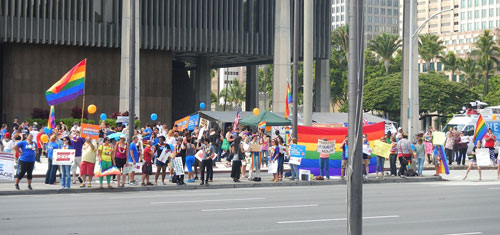
Fewer actual people. This was one of the larger gatherings by the homosexual activists outside the Hawaii State House. And many of these people, we were told, appeared to be brought in from the mainland. Their demonstrations were dwarfed by massive pro-family crowds.
Change is possible!
We strongly believe that a turnaround -- the road back -- on this issue is completely possible. That's why we're here. Sadly, in our opinion the biggest impediments are the our own current pro-family leaders who are stuck in the old-school rut. But what we saw in Hawaii and other states gives us a lot of hope that our using our strengths properly will have incredible effects. We just need to do it.
And of course, this is not to demean the thousands of dedicated pro-family people across America (and beyond) who have fought so hard. We want to use their wonderful efforts more effectively.
As we've said, the homosexual "successes" around the country are a house of cards. If we can put the pieces together, we can begin the march back to normalcy.
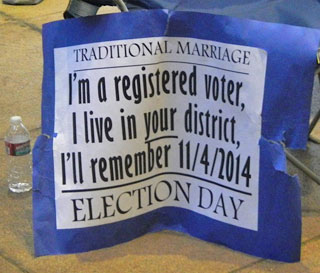
Not giving up. We have a feeling that more of these will be seen around the Hawaii State House -- and across the state!
(There's even a website: www.HawaiiRemembers.com)
In fact, signs like these should be up across America.
|
|
|
|
|
|